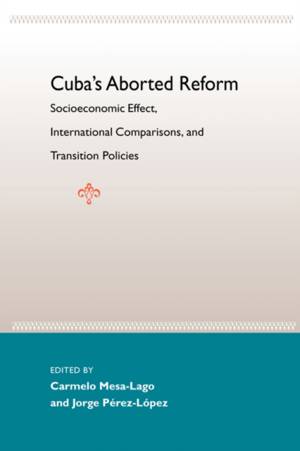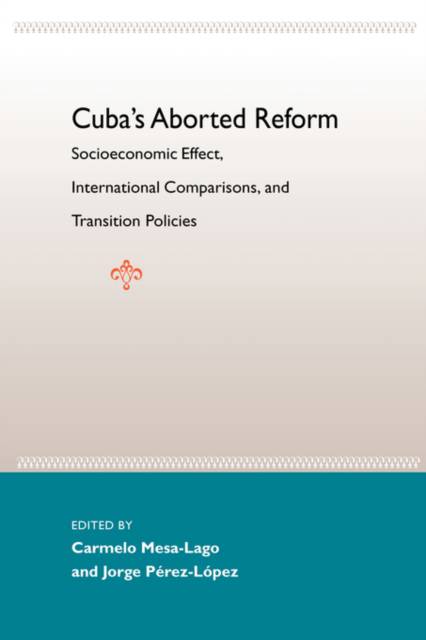
- Afhalen na 1 uur in een winkel met voorraad
- Gratis thuislevering in België vanaf € 30
- Ruim aanbod met 7 miljoen producten
- Afhalen na 1 uur in een winkel met voorraad
- Gratis thuislevering in België vanaf € 30
- Ruim aanbod met 7 miljoen producten
Zoeken
Cuba's Aborted Reform
Socioeconomic Effects, International Comparisons, and Transition Policies
Carmelo Mesa-Lago, Jorge F Pérez-López
Paperback | Engels
€ 24,45
+ 48 punten
Uitvoering
Omschrijving
"Mesa-Lago and Pérez-López have achieved the rarest of feats: they have given us a dispassionate, data-rich, comparative, provocative, and policy-oriented analysis of Cuba's aborted economic reforms of the last decade."--Ted Henken, Baruch College, CUNY "The most calm and careful analysis yet of Cuba in 2005."--Irving Louis Horowitz, Rutgers University "An excellent contribution to the economic literature in Cuba . . . A must read for scholars interested in Cuban affairs, as well as for those with broader concerns such as U.S. foreign policy and general prescriptions for countries transiting to more liberal economic policies . . . Timely and well documented . . . Highly recommended for those interested in the island, U.S.-Cuba relations, and Latin American affairs generally."--Sergio Diaz-Briquets, senior vice president, Casals & Associates, international management consulting and communications firm "Informative. Comprehensive. Systematically comparative. Mesa-Lago and Pérez-López bring their years of path-breaking excellent research on the Cuban economy to describe how Cuba responded to the crisis provoked by the collapse of the Soviet Union ... A sure and clear guide to understanding Cuba's economy today."--Jorge Domínguez, Weatherhead Center for International Affairs, Harvard University "Timely proposes moderate recommendations on desirable economic reforms in post-Castro Cuba . . . recommend[ed] to all who have interests, not only in the Cuban economy, but also [in] economic development and social welfare in general, and in transition from socialist systems towards the market."--Kanako Yamaoka, Institute of Developing Economies This volume analyzes Cuban socioeconomic policies and evaluates their performance since the collapse of the Soviet Union and the socialist camp. It provides a brief historical background to the crisis and analyzes in detail the deterioration and incomplete recovery since 1990. Comparing Cuba's performance with that of other Latin American and former socialist countries, it summarizes the views of noted Cuban economists and proposes policies that architects of the Cuban transition might wish to put in place after the passing of Castro.Focusing on economic and social policies and performance during the "Special Period in Time of Peace" (1990-2004), the authors draw on an impressive array of statistics (synthesized in 28 tables) to show that in 2005 Cuba has yet to return to economic levels of the late 1980s, and the access and quality of many of the highly touted social services--education, health care, social security, housing--also have not been restored to the levels achieved prior to the economic crisis triggered by the collapse of the Soviet Union. Meanwhile, they argue, poverty has expanded and unequal access to foreign remittances combined with expanding income differences have exacerbated social inequalities and widened the consumption gap between those with access to hard currency and those without. The authors demonstrate that governmental concerns about a strengthening private sector resulting in loss of political control finally prompted the Cuban leadership to prioritize political over economic ends. It aborted the modest market-oriented reforms of 1993-1996 and actually reversed them in 2003-2004, recentralized the economy, drastically reduced the limited spaces for private economic activity, exerted increasing control over hard currency, prohibited the circulation of the dollar, and stepped up repressive measures on peaceful dissidents. Centralized economic control has been fully restored, even though it will undoubtedly result in further deterioration of economic conditions and declining standards of living. Carmelo Mesa-Lago is distinguished professor emeritus of economics and Latin American studies at the University of Pittsburgh. His most recent books include Market, Socialist and Mixed Economies: Comparative Policy and Performance--Chile, Cuba, and Costa Rica and Las Reformas de Pensiones en America Latina y su Impacto en los Principios de la Seguridad Social. Jorge Pérez-López is an international economist whose most recent books include Conquering Nature: The Environmental Legacy of Socialism in Cuba and Cuba's Second Economy: From Behind the Scenes to Center Stage
Specificaties
Betrokkenen
- Auteur(s):
- Uitgeverij:
Inhoud
- Aantal bladzijden:
- 240
- Taal:
- Engels
Eigenschappen
- Productcode (EAN):
- 9780813030937
- Verschijningsdatum:
- 30/10/2005
- Uitvoering:
- Paperback
- Formaat:
- Trade paperback (VS)
- Afmetingen:
- 152 mm x 229 mm
- Gewicht:
- 367 g

Alleen bij Standaard Boekhandel
+ 48 punten op je klantenkaart van Standaard Boekhandel
Beoordelingen
We publiceren alleen reviews die voldoen aan de voorwaarden voor reviews. Bekijk onze voorwaarden voor reviews.











